Simferopol
Simferopol (/ˌsɪmfəˈroʊpəl/) is the second-largest city on the Crimean Peninsula, and the capital of the (Autonomous) Republic of Crimea. Simferopol is an important political, economic and transport hub of the peninsula, and serves as the administrative centre of both Simferopol Municipality and the surrounding Simferopol District. Founded on the site of a Crimean Tatar town Aqmescit, the city adopted its current name after the annexation of the Crimean Khanate to the Russian Empire. The population was 332,317 (2014 Census).[2]
Simferopol | |
|---|---|
Independent city1 within Crimea2 | |
| Ukrainian transcription(s) | |
| • National | Simferopol |
| • ALA-LC | Simferopol′ |
| • BGN/PCGN | Simferopol’ |
| • Scholarly | Simferopol′ |
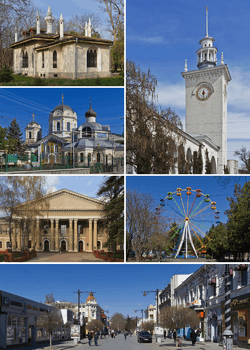 Clockwise: The railway station, Salgirka park, Trinity Cathedral, the State Medical University, Children's park, Catherine street | |
 Flag  Coat of arms | |
| Nickname(s): Город пользы (in Russian) The City of usefulness (translation) | |
.svg.png) Simferopol (red) on a map of Crimea. | |
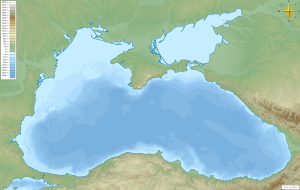 Simferopol | |
| Coordinates: 44°57′7″N 34°6′8″E | |
| Country | Disputed: |
| Region | |
| Municipality | Simferopol Municipality |
| Founded3 | XVth century |
| Boroughs | List
|
| Area | |
| • Total | 107 km2 (41 sq mi) |
| Elevation | 350 m (1,150 ft) |
| Population (2014) | |
| • Total | 332,317 |
| • Density | 3,183.17/km2 (8,244.4/sq mi) |
| Demonym(s) | Simferopolitan |
| Time zone | UTC+3 (MSK (de facto)) |
| Postal code | 295000—295490 (de facto) |
| Area code(s) | +7 3652 |
| Licence plate | AK(UA) 82(Rus)[1] |
| Sister cities | Heidelberg, Kecskemét, Salem, Bursa, Eskişehir, Rousse, Nizhny Novgorod |
| Website | simgov |
| 1 City of regional significance (de jure) or city of federal subject significance (de facto), depending on jurisdiction.
2 Autonomous Republic of Crimea (de jure) or Republic of Crimea (de facto), depending on jurisdiction. 3 Founded in 1784 as Simferopol, previously known under the Crimean Tatar Aqmescit. | |
Etymologies
The name Simferopol (Ukrainian: Сімферо́поль; Russian: Симферо́поль [sʲɪmfʲɪˈropəlʲ]) comes from the Greek Sympheropoli (Greek: Συμφερόπολη, Symferópoli), meaning city of common good. The spelling Symferopil (Ukrainian: Симферопіль) is also used.[3]
In Crimean Tatar, the name of the city is Aqmescit, which means The white mosque (Aq—white, and mescit—mosque). In fact, aq does not refer to the color of the mosque, but to its location. This is due to the color designation of the cardinal points among the Turkic peoples, where white is the west. Thus, the exact translation of the name of the town is the Western Mosque.
In English, the name was often given as Akmechet or Ak-Mechet (e.g. in Encyclopædia Britannica[4]), a transliteration from Russian spelling of Crimean Tatar word Акмечет, Ак-Мечеть, where Mechet (Мечеть) is the Russian word for "mosque".
History
Early history
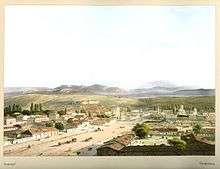
Archaeological evidence in the Chokurcha cave shows the presence of ancient people living in the territory of modern Simferopol. The Scythian Neapolis, known by its Greek name, is also located in the city, which is the remnants of an ancient capital of the Crimean Scythians who lived on the territory from the 3rd century BC to the 4th century AD.[5]
Later, the Crimean Tatars founded the town of Aqmescit. For some time, Aqmescit served as the residence of the Qalğa-Sultan, the second most important position in the Crimean Khanate after the Khan himself.[6]
Russian Empire
The city was renamed Simferopol in 1784 after the annexation of the Crimean Khanate to the Russian Empire by Catherine II of Russia. The name Simferopol is in Greek, Συμφερόπολις (Simferopolis), and literally means "the city of usefulness." The tradition to give Greek names to places in newly acquired southern territories was carried out by Empress Catherine the Great as part of her Greek Plan.[6][7] In 1802, Simferopol became the administrative centre of the Taurida Governorate. During the Crimean War of 1854–1856, the Russian Imperial Army reserves and a hospital were stationed in the city. After the war, more than 30,000 Russian soldiers were buried in the city's vicinity.
20th-century wars
In the 20th century, Simferopol was once again affected by wars and conflicts in the region. At the end of the Russian Civil War, the headquarters of General Pyotr Wrangel, leader of the anti-Bolshevik White Army, were located there. On 13 November 1920, the Red Army captured the city and on 18 October 1921, Simferopol became the capital of the Crimean Autonomous Soviet Socialist Republic.
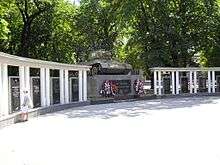
During World War II, Simferopol was occupied by Nazi Germany from 1 November 1941 to 13 April 1944. Retreating NKVD police shot a number of prisoners on 31 October 1941 in the NKVD building and the city's prison.[8] Germans perpetrated one of the largest war-time massacres in Simferopol, killing in total over 22,000 locals—mostly Jews, Russians, Krymchaks, and Romani.[9] On one occasion, starting 9 December 1941, the Einsatzgruppen D under Otto Ohlendorf's command killed an estimated 14,300 Simferopol residents; most of them were Jews.[10]
In April 1944 the Red Army liberated Simferopol. On 18 May 1944 the Crimean Tatar population of the city, along with the whole Crimean Tatar nation of Crimea, was forcibly deported to Central Asia in a form of collective punishment.
Within Ukraine
On 26 April 1954 Simferopol, together with the rest of the Crimean Oblast, was transferred from the Russian Soviet Federative Socialist Republic to the Ukrainian Soviet Socialist Republic by Soviet Premier Nikita Khrushchev.
An asteroid, discovered in 1970 by Soviet astronomer Tamara Mikhailovna Smirnova, is named after the city (2141 Simferopol).[11]
Following a referendum on 20 January 1991, the Crimean Oblast was upgraded an Autonomous Soviet Socialist Republic on 12 February 1991 by the Supreme Soviet of the Ukrainian SSR.[12] Simferopol became the capital of the Crimean Autonomous Soviet Socialist Republic.
After the collapse of the Soviet Union in 1991, Simferopol became the capital of the Autonomous Republic of Crimea within newly independent Ukraine. Today, the city has a population of 340,600 (2006) most of whom are ethnic Russians, with the rest being Ukrainian and Crimean Tatar minorities.
After the Crimean Tatars were allowed to return from exile in the 1990s, several new Crimean Tatar suburbs were constructed, as many more Tatars returned to the city compared to number exiled in 1944. Land ownership between the current residents and returning Crimean Tatars is a major area of conflict today with the Tatars requesting the return of lands seized after their deportation.[13]
Russian annexation
On 16 March 2014, a referendum was held whose results showed that a majority of Crimeans voted in favour of independence of Crimea from Ukraine and joining Russia as a federal subject. The legitimacy of the referendum's results has been questioned by several nations and independent news organizations.[14] On 21 March, Simferopol officially became the capital of a new federal subject of the Russian Federation.[15] The referendum was not recognized internationally, and the event was viewed by many as an annexation of the Crimean land by the Russian Federation.
On 14 September 2014, municipal elections were held as part of the Russian Federation, the first elections since the Crimean status referendum of 16 March 2014.
Geography and climate
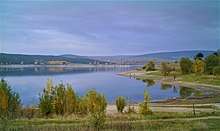
Location
Simferopol is located in the south-central portion of the Crimean Peninsula. The city lies on the Salhir River and near the artificial Simferopol Reservoir, which provides the city with clean drinking water. The Simferopol Reservoir's earth dam is the biggest in Europe.
Climate
The city experiences a humid subtropical or oceanic climate (depending on which version of the Köppen climate classification is used),[16] near the boundary of the humid continental climate. The average temperature in January is 0.2 °C (32.4 °F) and 22.3 °C (72.1 °F) in July. The average rainfall is 514 millimetres (20.2 in) per year, and there is a total of 2,471 hours of sunshine per year.
| Climate data for Simferopol (1981–2010 normals, extremes 1886–present) | |||||||||||||
|---|---|---|---|---|---|---|---|---|---|---|---|---|---|
| Month | Jan | Feb | Mar | Apr | May | Jun | Jul | Aug | Sep | Oct | Nov | Dec | Year |
| Record high °C (°F) | 20.4 (68.7) |
21.9 (71.4) |
28.7 (83.7) |
31.5 (88.7) |
34.2 (93.6) |
37.7 (99.9) |
39.3 (102.7) |
39.5 (103.1) |
37.2 (99.0) |
33.3 (91.9) |
28.0 (82.4) |
25.4 (77.7) |
39.5 (103.1) |
| Average high °C (°F) | 3.9 (39.0) |
4.7 (40.5) |
9.1 (48.4) |
15.9 (60.6) |
21.4 (70.5) |
25.7 (78.3) |
28.9 (84.0) |
28.6 (83.5) |
23.1 (73.6) |
17.0 (62.6) |
10.4 (50.7) |
5.6 (42.1) |
16.2 (61.2) |
| Daily mean °C (°F) | 0.2 (32.4) |
0.4 (32.7) |
3.9 (39.0) |
9.9 (49.8) |
15.1 (59.2) |
19.5 (67.1) |
22.3 (72.1) |
22.0 (71.6) |
16.9 (62.4) |
11.3 (52.3) |
5.8 (42.4) |
2.0 (35.6) |
10.8 (51.4) |
| Average low °C (°F) | −2.9 (26.8) |
−3.2 (26.2) |
−0.2 (31.6) |
4.8 (40.6) |
9.5 (49.1) |
13.9 (57.0) |
16.5 (61.7) |
16.1 (61.0) |
11.6 (52.9) |
6.8 (44.2) |
2.2 (36.0) |
−1.1 (30.0) |
6.2 (43.2) |
| Record low °C (°F) | −26.0 (−14.8) |
−30.3 (−22.5) |
−18.4 (−1.1) |
−11.1 (12.0) |
−8.4 (16.9) |
0.7 (33.3) |
3.6 (38.5) |
3.8 (38.8) |
−5.1 (22.8) |
−11.4 (11.5) |
−21.7 (−7.1) |
−23.2 (−9.8) |
−30.3 (−22.5) |
| Average precipitation mm (inches) | 39 (1.5) |
36 (1.4) |
38 (1.5) |
34 (1.3) |
35 (1.4) |
58 (2.3) |
45 (1.8) |
52 (2.0) |
42 (1.7) |
42 (1.7) |
49 (1.9) |
45 (1.8) |
514 (20.2) |
| Average rainy days | 12 | 11 | 11 | 11 | 10 | 11 | 8 | 7 | 10 | 11 | 13 | 14 | 129 |
| Average snowy days | 11 | 11 | 7 | 1 | 0 | 0 | 0 | 0 | 0 | 1 | 4 | 9 | 44 |
| Average relative humidity (%) | 85 | 81 | 76 | 69 | 68 | 67 | 63 | 63 | 69 | 76 | 82 | 84 | 74 |
| Mean monthly sunshine hours | 88 | 100 | 164 | 211 | 282 | 314 | 341 | 316 | 261 | 204 | 114 | 75 | 2,470 |
| Source 1: Pogoda.ru.net[17] | |||||||||||||
| Source 2: NOAA (sun 1961–1990)[18] | |||||||||||||
Politics and administrative divisions
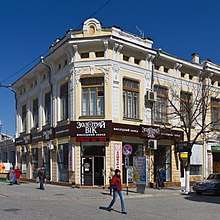
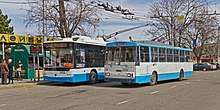
As the capital of the Republic, Simferopol houses its political structure including the Parliament and the Council of Ministers. Simferopol is also the administrative centre of the Simferopolskyi District (raion), however, it is directly subordinate to the Crimean authorities rather than to the district authorities housed in the city itself.
The city of Simferopol is administratively divided into three districts (Zaliznychnyi, Tsentralnyi, and Kyivskyi), four urban-type settlements (Ahrarne, Aeroflotskyi, Hriesivskyi, Komsomolske) and one village (Bitumne).[19]
Viktor Ageev became city mayor on 11 November 2010 and was then elected chairman of the Simferopol City Council on 29 September 2014.[20]
Igor Lukashyov was installed as the head of Simferopol City administration (i.e. local executive) after Russia annexed the region in 2014. He served in this position until his dismissal on 9 November 2018.[21]
Transportation
Simferopol has a major railway station, which serves millions of tourists each year. In December 2014 Ukraine cut the railway line to Crimea at the border. Currently, the station serves only a commuter (regional) passenger train and the Moscow – Simferopol train every day.
The city is also connected via the Simferopol International Airport, which was constructed in 1936.[22] Zavodskoye Airport is situated southwest of Simferopol.
The city has several main bus stations, with routes towards many cities, including Sevastopol, Kerch, Yalta, and Yevpatoriya. The Crimean Trolleybus connects Simferopol to the city of Yalta on Crimean Black Sea coast. The line is the longest trolleybus line in the world with a total length of 86 kilometres (53 mi)[23] (since 2014 again 96 kilometres (60 mi)).
The streets of Simferopol have a rare house numbering – the odd numbers are on the right side of the road, looking in the direction in which the numbers increase.
Demographics
At the last census in 2014, the population of Simferopol was 332,317, the highest of any city in the Republic of Crimea and second only to Sevastopol within the Crimean peninsula.
Economy
When it existed, Crimea Air had its head office on the grounds of Simferopol Airport.[24] Simferopol hosts some industries, such as 'Zavod 'Phiolent' JSC producing Marine automation control systems; Precise electrical micro machines of low input power; Power tools, for both professional and household usage.
- Simferopol Airport , new terminal is to be open with at least 8 gates, the structure of the hall has a wave-like layout.
Industry
- Fiolent (two locations)
- Simferopol chemical industry plants
- PO Foton
- Simferopol Airport
- SEM SElktroMash SELMZ
- Plastotekhnika and else plastics related
- Santekhprom SSTP
- PEK PromElektroKontakt and PromSchitKontakt, ChPO Sfera IzmertelnPribor, SELTZ ElectroTechnical Plant
- Pnevmatika, other pneumatics tires etc. related industry
- Monolit SMZKon, TsSI Tavrida SKMKZ, Slava Truda SCMNG, SiMZ Motor Plants
- Chornomornaftogaz
- Digital Valley (Tsifrovaya Dolina): silicon industry, computers, wafers and microelectronics, it, other related. It will located (most likely) near the airport for convenience.
Education
The largest collection of higher education institutions in Crimea is located in Simferopol. Among them is the largest university in Simferopol and Crimea, the Taurida V.Vernadsky National University, which was founded in 1917.[25] Crimea State Medical University named after S. I. Georgievsky, also located in Simferopol, is one of the most prominent medical schools of Ukraine. The Crimean Medical University is situated on the plot, where in 1855 a nursery garden was planted by the founder of the Nikita Botanical Gardens Ch.Ch.Steven (1781–1863). In 1863–66 a school for girls was built here and in 1931 a medical institute was opened. On the same plot P.Krzhizhanovsky built a three-storey hostel for medical students after the design in 1934. The building with clear geometric masses was completed in 1938. A new federal university campus was opened 4 August 2014.
Sports
Simferopol is home to the football club FC TSK Simferopol which plays in the Crimean Premier League. It was formed as a Russian club in 2014, following the 2014 Crimean Conflict, to replace the Ukrainian club Tavriya Simferopol which had been the first winners of the Ukraine Premier League, and also won the Ukrainian Cup in 2010.
Famous people
- Max Alpert, a prominent Soviet photographer, who was mostly known for his frontiline work during World War II
- Lyudmila Blonska, Ukrainian heptathlete
- Nadya Dorofeeva, female vocalist of the pop duo Vremya i Steklo
- Viktor Grebennikov, Russian scientist, naturalist, entomologist, entomological artist and writer
- Andriy Hryvko, a Ukrainian cyclist who rides for Astana
- Adolph Joffe, a Russian Communist revolutionary, a Bolshevik politician and a Soviet diplomat
- Sergey Karjakin, the youngest chess grandmaster in history at the age of 12 years and 7 months
- Yana Klochkova, a Ukrainian swimmer, who has won five Olympic medals in her career, with four of them being gold
- Oleg Kotov, Russian Air Force colonel, Expedition 15 Soyuz commander and flight engineer
- Zara Levina, Russian composer
- Saint Luke of Simferopol, born Valentin Felixovich Voino-Yasenetsky, Russian surgeon and Archbishop of Simferopol
- Alisa Melekhina, chess master, attorney, author, and classically trained ballerina
- Sergey Mergelyan, Armenian scientist and mathematician
- Yuri I. Manin, Russian-born mathematician
- Ganna Rizatdinova, an individual rhythmic gymnast, silver medallist at the individual all-around competition, ribbon final and gold medallist at the hoop final in the World Championships held in Kiev 2013
- Ekaterina Serebrianskaya, Ukrainian individual rhythmic gymnast. Olympic champion in Atlanta 1996.
- Valery Sigalevitch, Russian pianist
- Alexei Stepanov, Russian genre painter
- Evhen Tsybulenko, Estonian professor of international law
- Oleksandr Usyk, Ukrainian boxer, olympic gold medalist at heavyweight in 2012, and undisputed cruiserweight champion.
- Rostislaw Wygranienko, Polish organist
International relations
Twin towns – Sister cities
Simferopol is currently twinned with:











References
- Для крымских автомобилистов приготовили новые номера. Segodnya (in Russian). 2 April 2014. Archived from the original on 6 July 2015. Retrieved 6 July 2015.
- Russian Federal State Statistics Service (2014). "Таблица 1.3. Численность населения Крымского федерального округа, городских округов, муниципальных районов, городских и сельских поселений" [Table 1.3. Population of Crimean Federal District, Its Urban Okrugs, Municipal Districts, Urban and Rural Settlements]. Федеральное статистическое наблюдение «Перепись населения в Крымском федеральном округе». ("Population Census in Crimean Federal District" Federal Statistical Examination) (in Russian). Federal State Statistics Service. Retrieved 4 January 2016.
- "Simferopol - Ukraine". britannica.com. Retrieved 20 March 2018.
- Ak-Mechet, an article from Encyclopædia Britannica
- "Simferopol". Encyclopædia Britannica Online. Retrieved 13 May 2008.
- "Simferopol". Vacation in Crimea (in Russian). Retrieved 14 May 2008.
- "Russian cities with Greek names". Sevastopolskaya gazeta (in Russian). 20 July 2006. Retrieved 14 May 2008.
- Kirimal, Edige. "Complete Destruction of National Groups as Groups". International Committee for Crimea. Retrieved 13 May 2008.
- "Simferopol". simferopol.ws (in Russian). Retrieved 13 May 2008.
- Das Personenlexikon zum Dritten Reich. Wer war was vor und nach 1945. Fischer Taschenbuch Verlag, Zweite aktualisierte Auflage, Frankfurt am Main 2005, page 72
- Schmadel, Lutz D. (2003). Dictionary of Minor Planet Names (5th ed.). New York City: Springer Verlag. p. 174. ISBN 3-540-00238-3.
- "Day in history – 20 January". RIA Novosti (in Russian). 8 January 2006. Archived from the original on 30 September 2007. Retrieved 6 August 2007.
- "Tatars push to regain their historic lands in Crimea". Today's Zaman. 31 March 2006. Archived from the original on 30 September 2007. Retrieved 14 May 2008.
- "Crimeans vote over 90 percent to quit Ukraine for Russia". 16 March 2014. Retrieved 20 March 2018 – via Reuters.
- Putin signs reunification laws for Crimea, Sevastopol | Voice of Russia
- Kottek, M.; J. Grieser; C. Beck; B. Rudolf; F. Rubel (2006). "World Map of the Köppen-Geiger climate classification updated" (PDF). Meteorol. Z. 15 (3): 259–263. doi:10.1127/0941-2948/2006/0130. Retrieved 11 December 2012.
- "Climate Averages for Simferopol" (in Russian). Weather and Climate (Погода и климат). Retrieved 14 December 2019.
- "Simferopol Climate Normals 1961–1990". National Oceanic and Atmospheric Administration. Retrieved 28 November 2015.
- "City of Simferopol Autonomous Republic of Crimea". Verkhovna Rada of Ukraine (in Ukrainian). Archived from the original on 20 February 2009. Retrieved 14 May 2008.
- "Биография". Retrieved 28 December 2017.
- Russia-Installed Head Of Crimea's Capital Removed
- "Welcome to the International Airport "Simferopol"". Simferopol International Airport. Archived from the original on 5 May 2008. Retrieved 14 May 2008.
- "The longest trolleybus line in the world!". blacksea-crimea.com. Retrieved 14 May 2008.
- "World Airline Directory." Flight International. 27 March – 2 April 2001. 57.
- "Main page". Vernadskiy Tavricheskiy National University. Retrieved 30 July 2008.
- "Twinning". City of Heidelberg. Archived from the original on 10 June 2011. Retrieved 12 November 2009.
External links
| Wikimedia Commons has media related to Simferopol. |
| Look up Simferopol in Wiktionary, the free dictionary. |

- Simferopol Government Official website
- The murder of the Jews of Simferopol during World War II, at Yad Vashem website.
- . Encyclopædia Britannica (11th ed.). 1911.